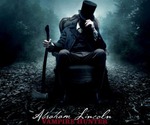 It happens every so often. Two movies with similar plots and subject matter are released within a very short period of time.
It happens every so often. Two movies with similar plots and subject matter are released within a very short period of time.
By Noah Gittell
 It happens every so often. Two movies with similar plots and subject matter are released within a very short period of time. Think “Armageddon” and “Deep Impact.” Or “K-9” and “Turner and Hooch.” Or all of those body-swap movies from the ’80s. Now it is Abraham Lincoln’s turn. He is the subject matter of both the highbrow Spielberg biopic, “Lincoln,” opening this Christmas, and the no-brow action fantasy “Abraham Lincoln: Vampire Hunter,” which opened last Friday.
It happens every so often. Two movies with similar plots and subject matter are released within a very short period of time. Think “Armageddon” and “Deep Impact.” Or “K-9” and “Turner and Hooch.” Or all of those body-swap movies from the ’80s. Now it is Abraham Lincoln’s turn. He is the subject matter of both the highbrow Spielberg biopic, “Lincoln,” opening this Christmas, and the no-brow action fantasy “Abraham Lincoln: Vampire Hunter,” which opened last Friday.
Not much is known about Spielberg’s “Lincoln,” although I would guess its tone will be reverential. That’s kind of Spielberg’s thing. It should come as no surprise that “Vampire Hunter” takes the exact same tack. There is simply no room in our world for a Lincoln movie that portrays him as anything but an unqualified hero. His myth is too large and too important to our national psyche. Although the styles and tones of this year’s Lincoln films will be markedly different, “Vampire Hunter” gives our 16th president the highest honor, reframing him as the archetype that our culture reveres the most: the action hero.
The story follows him from childhood right up until his assassination. As a boy, Lincoln watches as a vampire/slave-driver beats his best friend and murders his mother. As he grows into a young man, he vows revenge until he learns a secret from his friend, Henry (Dominic Cooper). The man who killed Lincoln’s mother is a vampire, and there are others. The South is littered with vampires, and, worse than that, they are beginning to expand their territory.
It’s not the most nuanced view of Civil War-era politics, but it is representative of the film’s approach to storytelling. There is nothing subtle here. As Henry turns Lincoln from a young, angry man into an axe-wielding killer of the undead, a formula common in superhero origin movies begins to emerge. There is a lengthy training sequence. A tense first outing as crime-fighter that almost ends in disaster. He meets a girl, the young Mary Todd, whom he loves and wishes to marry, although he fears that the vampires will target her to punish him. He puts his alter ego aside, as he learns the power of the bully pulpit and decides to fight slave-owners/vampires with words instead of an axe.
Between what we know of Lincoln’s life and our recognition of this formula, there are few surprises in the film. But no matter: “Vampire Hunter” is more spectacle than story. Director Timur Bekmambetov (“Wanted”) knows how to stage an action sequence and set a mood, although he has no feel for drama. Similarly, as Lincoln and Mary Todd, stars Benjamin Walker and Mary Elizabeth Winstead have charisma and chemistry, but their efforts are largely wasted in a script that uses only romantic clichés to characterize them. Still, Walker’s performance is worth lingering on. His Lincoln is humble yet determined, with a dash of comic awkwardness. It is a star-making turn, and we’ll be seeing more of the young Walker in the near future, I’m sure.
Although the film is far more concerned with entertaining a summer audience than provoking thought, it is to the filmmaker’s credit that he does not shy away from the moral imperatives of the era in which the film is set. While the film only loosely associates slavery with vampirism, Lincoln’s quest for justice is his motivating characteristic. It’s a bit easy, I suppose, to make us root for him: he is working to end slavery and save the human race from evil monsters. But why did it need to go this far? Isn’t our nation’s history of slavery monstrous enough?
It’s a good question but not one this film is interested in answering. Seth Grahame-Smith, the screenwriter who also authored the book “Vampire Hunter” is based on, has remarked that he came up with the idea after seeing a biography of Lincoln next to a “Twilight” novel in a bookstore. And that’s about as deep as this movie goes. Like its hero, it is largely apolitical, but that’s what you get when you deal with Lincoln, our least politicized and most idealized political leader. If you prefer a more thoughtful piece of reverence, then wait for Spielberg. “Vampire Hunter” offers only cheap thrills and a story that affirms our pre-conceived notion of a transcendent president.
My Rating: Put it on your Queue















